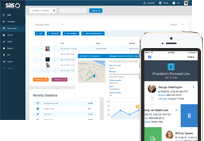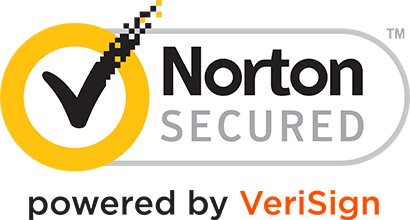- Log In
- Support
- Company
- Contact Us
- Live answers @ 1-888-532-4794
5 Ways to Help Your Business Communicate Throughout the Coronavirus Crisis
Unless you’re pretty handy with a crystal ball, no one could have predicted the current situation in which many businesses currently find themselves: closed temporarily due to a global pandemic. It’s like something out of a movie. The tsunami hits, and everyone is thrust into the midst of chaos with no idea how to navigate a crisis of this magnitude.
Despite social distancing mandates, the blight of COVID-19 has actually brought people closer together on a humanitarian level. Maybe you’ve checked in more with family. Maybe it’s made you more aware of the needs of the elderly or disabled in your community, or increasingly grateful for medical professionals and other first responders. With true face-to-face communication at a standstill, we’ve been pushing the limits of technology as we maintain contact with our social networks. And for business owners, enhanced communication has never been more critical than it is now.
In some respects, an organization’s availability translates to reliability. When customers have an abundance of ways to connect with you, and when you promptly and effectively respond to their questions and concerns, you build trust and the likelihood of repeat business. So, if you already have a business contingency plan in place, a strong online presence, and an answering service managing inbound calls 24/7, you’re a step ahead of the game and well-prepared for the unexpected. On the flipside, if this situation has undeniably highlighted holes in your communication strategies, then you have some work to do to keep yourself afloat. Just a few changes will improve connectivity across all channels.
#1 – Coordinate Website & Social Media Updates
First things first, update your website, and be sure that information is changed as the situation evolves. Include details such as:
Open / Close Hours
- Open hours during which patrons may visit
- 24/7 availability, depending on the type of business
- House calls or technicians’ hours
Contact Methods
- Standard contact
- Website and Social Media contact
- Emergency support contact
Products / Services
- Changes to pricing or availability of certain products or services
- Order lead time or delivery delays
COVID-19 Precautions
- If house calls or technicians’ visits are necessary, spell out how you will protect your employees and customers from COVID-19. For example, “All of our technicians are equipped with protective outerwear, shoe covers, gloves and face masks to minimize the risk of spreading or acquiring germs.”
You’ll also need to use social media outlets to let customers know that you’re still operational and here to help. If you’re in a time crunch, there are social media management tools that enable you to update all social media accounts simultaneously. Set time aside each day to update platforms with consumer tips, pictures from the field, new developments, inspirational stories, and anything else that will put an encouraging spin on a challenging situation. Welcome customers’ comments and personal experience, and follow up so that they know you’re listening. Show them how much you value their continued support. Then, when this crisis is behind us, your reputation for being a gracious business owner will precede you.
#2 – Send Text & Email Blasts
If you haven’t already sent out a mass communication to your customers, create a bullet-points list that echoes the information posted on your website, and include an introductory message from the owner or CEO regarding the company’s response and commitment to serve customers, come what may. That personal touch goes a long way, and it is more important now than ever. We all have the same concerns. It’s best to address them directly, from the top.
Don’t forget to include quick links for contact by phone and email, as well as links to your website and all social media pages. Before you click send, check to see that you have the appropriate text and email consent on file. Be mindful that FCC guidelines protect consumers from receiving unsolicited text and email messages.
#3 – Offer Video Chat
A slew of businesses and social networks are jumping on the video chat bandwagon, using services such as Skype, Webex, GoToMeeting, and Doxy.me, among others. Many are end-to-end encrypted (research each service to look for these features), which makes them accessible for a variety of industries. It’s as easy as sending a link via text or email to your customer or patient and signing on at the scheduled time. Though it is not a viable solution for everyone, it affords the ability to stay connected and offers peace of mind to those you serve.
#4 – Whenever Possible, Enable Remote Working
Having a cloud-based CRM and ticketing system such as Zendesk, NetSuite or HubSpot, means that any employee with an Internet connection can access data and respond to customers’ queries, regardless of location. Some systems will even present an alert if colleagues are working on the same ticket simultaneously, which saves time and prevents doubled efforts. Couple that with a cloud-based phone system such as RingCentral or Grasshopper, and your team will be able to maintain the high-level customer support that you’re known for, all from the comfort of their shelter-in-place.
At a time when the job market is so uncertain, one key takeaway here is that establishing a remote-working protocol just may be the one thing that boosts job retention for millions of people. Having a robust work-at-home plan benefits customers and employees alike. Once established, it will always be available as a failsafe. And, from an employee’s perspective, knowing that you still have a steady paycheck is invaluable.
#5 – Consider an Answering Service
Much like the national run on toilet paper, people start scrambling when they realize that the goods and services on which they depend may not be available in the short term. With this, you may see a swell of inbound calls from people wanting to know exactly where things stand. Yes, this information is on your website and social media outlets and was sent via text and email. But there is nothing like the reassurance of speaking with a live agent.
For example, SAS offers a free answering service. through our two-week free trial period. With that comes a number of benefits, including customized upfront greetings, warm and cold transfers to you or your employees, reach on-call for emergencies, appointment scheduling, message delivery by text and email, integrations with a variety of CRM software, and more. Depending on the service, you might pay per-minute or per-call after the trial period has ended, and plans can be adjusted based on pre- and post-COVID call volume. Customers will appreciate being able to reach someone, even if your offices or storefronts are closed. And you’ll appreciate never missing a call or having to wade through a flood of voicemails.
We’re lucky to be living in a time when reaching out to people has never been easier, and nothing drives that point home more than when a single virus shuts down half the world. Whatever your industry, and however large your customer base, communication is the backbone of every powerful business. Strengthen your approach now, and you’ll fortify your bottom line in the midst of, and well after, the COVID-19 crisis.
Categories
- Advice (32)
- Answering Service 101 (18)
- Best Practices (10)
- Call Center Jobs (6)
- Call Center Software (20)
- Comparison (2)
- Customer Service (30)
- Funny (31)
- Holidays (19)
- Industry Hacks (19)
- Infographics (53)
- International (1)
- Medical (8)
- News (12)
- Phone Etiquette (2)
- Phones (14)
- Pricing (8)
- Quizzes (3)
- Receptionist (11)
- SAS Products (29)
- Scripting (4)
- Services (5)
- Small Business (25)
- Starting Up (7)
- Tips and Tricks (19)
- Uncategorized (1)
- Videos (19)
- Workplace (6)
Recently writen
- Call Center Script Best Practices: Advanced Script Block Tips to Optimize Your Answering Service
- January 2025 Release Notes – Adjustments to Call Details Timeline, New Scripting Updates, Live Transcription, and more!
- April 2024 Release Notes – Voicemail Greetings, Ability to Access Websites With a Username and Password, and more!
- March 2024 Release Notes – New Add-On, Settings Revamp, and more!
Follow Us
How about a demo?
We'll show you how our web portal works and answer any questions you have about SAS.
Schedule a demo







